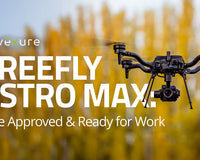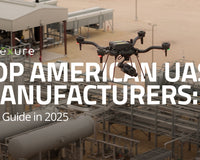In the evolving landscape of drone legislation, the Countering CCP Drones Act (H.R.6572) represents a pivotal moment that could redefine drones and their integration in our day-to-day operations. As members of the Drone Advocacy Alliance, we stand at the forefront of this conversation, committed to ensuring that our community stays informed and empowered.
This article will dive into the implications of this legislation, dispel common misconceptions, and spotlight the invaluable role of advocacy in safeguarding the future of drone technology we’ve all come to rely on.
Are you at risk of losing your ability to buy and operate DJI Drones? In short, the answer is NO if you’re not using federal funding, but that could change if we don't take action.
Understanding the Countering CCP Drones Act
The CCP Drones Act marks a significant moment in the evolving dynamics of international technology policy and drone regulation within the United States. Introduced by Congresswoman Elise Stefanik and Select Committee on the CCP Chairman Mike Gallagher, the bill reflects growing, though largely unfounded, concerns over national security and the strategic implications of drones on the foreign entities list, particularly those by Chinese companies like DJI.
Historical Context and Legislative Backers
The legislation emerges against heightened scrutiny of Chinese telecommunications and technology firms, paralleling earlier actions against companies like Huawei and ZTE. Congresswoman Stefanik and Chairman Gallagher have spearheaded this initiative to address perceived vulnerabilities posed by CCP-affiliated drone technology within critical U.S. infrastructures.
Objectives and Key Points
The Act's main objectives are an attempt to safeguard U.S. airspace from potential security threats with Chinese drones and to bolster national security by ensuring that vital drone technology is free from adversarial foreign influence.
Key points of the legislation include:
-
Prohibiting drone use by entities associated with the CCP in sensitive government operations.
-
Establishing a rigorous vetting process for drone technology used in national security contexts.
-
Encouraging the development and adoption of domestically produced drones to reduce reliance on foreign technology.
While Advexure understands the importance of building a strong U.S. economy while actively selling and supporting U.S. manufactured drones, we believe in a free market and ensuring that our customers and end-users have the best tools they need to do their jobs. This legislation and other similar bills are in direct opposition to our values — putting drone users and our customers FIRST.
Current Status of the Legislation
According to the Drone Advocacy Alliance, the Countering CCP Drones Act was recently discussed in a hearing by the United States House of Representatives Subcommittee on Communications and Technology. The hearing touched upon broader themes of reducing dependency on Chinese telecommunications systems, focusing on the implications for drones, specifically DJI products. Although DJI and the Countering CCP Drones Act were not the central subjects of discussion, their mention underscores the relevance of this legislation to the broader debate on U.S.-China technological competition.
Notably, the hearing DID NOT conclude with a vote on the Act, meaning that, for now, the legal landscape for DJI drone users remains unchanged.
The path forward for the bill involves several legislative steps, including a possible "markup" session for debate and voting in the subcommittee, followed by consideration by the full Energy & Commerce Committee and potentially the House Rules Committee before reaching the House floor. Despite the current ambiguity regarding the bill's progression, the drone community is urged to stay informed and engaged, given the unpredictable nature of legislative processes.
To put it simply, we can't rest on our laurels, and we have to stay involved.
Debunking Security Concern Myths
Many myths and misconceptions about data security have emerged in the discourse surrounding DJI drones, particularly in the context of the Countering CCP Drones Act. A closer examination of DJI's data handling practices reveals a robust framework to protect user data and mitigate unauthorized access.
Data Security Safeguards by DJI
DJI has implemented several safeguards to ensure the privacy and security of data collected by its drones:
-
Offline Operation: DJI drones can operate without an internet connection, allowing users to fly in "airplane mode," which negates any need for data transmission to or from the drone during operation.
-
Local Data Mode: This feature enables users to disable data transmission to and from DJI's flight apps while allowing the internet to be used for other purposes, such as accessing map services.
-
User Control Over Data: DJI empowers users with complete control over their data. The company does not access or store users' photos, videos, and flight logs unless explicitly shared by the operator.
-
Onboard Data Security: Select DJI drone models offer features like erasable logs, cache clearing, and password protection for onboard storage, enhancing the security of sensitive information.
-
U.S.-based Data Centers: For users who opt to share their data with DJI, this information is stored in U.S.-based data centers, ensuring that it remains within the jurisdiction and regulatory framework of the United States.
-
Encryption Standards: Shared sensitive information, like location data, is protected with AES-256 encryption, one of the most robust encryption standards.
-
Third-party Software Compatibility: DJI drones are compatible with numerous third-party software options, allowing users to select software that meets their specific security and feature requirements.
Validation by Independent and Government Agencies
Multiple independent and government assessments have validated DJI's commitment to data security:
-
Kivu Consulting: This cybersecurity firm's detailed examination of DJI drones and software concluded that DJI does not access users' data without consent.
-
Booz Allen Hamilton: Their risk assessment found no evidence of data transmission to unauthorized parties, including DJI or China.
-
FTI Consulting: Confirmed that with Local Data Mode enabled, no data is sent externally, and noted DJI's adherence to security best practices.
-
U.S. Department of the Interior (DOI): After extensive testing, DOI concluded that DJI drones were best suited for their missions without compromising data security.
-
U.S. Department of Commerce: Validated DJI's Core Crypto Engine as meeting the NIST standard FIPS 140-2, a key benchmark for government procurement cybersecurity.
The Real-World Impact on Industry Stakeholders
The utilization of DJI drones transcends mere technological novelty, reaching deep into the fabric of various sectors and profoundly impacting stakeholders by enhancing efficiency, safety, and operational capabilities. This section underscores the tangible benefits DJI drones have delivered across diverse fields, emphasizing the critical need for continued access to these transformative tools.
Public Safety and Law Enforcement
In the realm of public safety, DJI drones have become indispensable assets. For instance, the Outagamie County Sheriff's Office in Wisconsin represents a prime example of how DJI technology aids in life-saving missions. From locating missing individuals in challenging terrains to assisting in the apprehension of suspects through thermal imaging, DJI drones have bolstered the capabilities of law enforcement agencies nationwide. These tools enhance the efficiency of operations and ensure the safety of officers and the community by providing critical information in real time.
Entrepreneurship and Small
DJI drones have catalyzed a wave of entrepreneurial spirit, particularly in sectors like photography, real estate, and drone-based service providers. By integrating aerial imaging and data collection capabilities, small businesses have been able to innovate and offer new services, expanding their market reach and competitiveness. This technological empowerment has facilitated the growth of a vibrant community of drone enthusiasts and professionals, further fostering innovation and creativity within the industry.
Agriculture and Rural
In the agricultural sector, DJI drones like the DJI Agras have revolutionized traditional practices, enabling farmers to achieve higher crop management and resource allocation precision. By providing detailed aerial insights and facilitating targeted actions such as precise spraying and seeding, drones contribute significantly to sustainable farming practices, optimizing resource use and enhancing crop yields. This is particularly critical for rural America, where such technological advancements can improve productivity and sustainability in farming operations.
Infrastructure and Worker
DJI drones have also redefined the infrastructure inspection and maintenance approach, especially for industries with extensive and often inaccessible assets, such as oil and gas or telecommunications. By deploying drones for aerial inspections, companies can significantly reduce the need to expose workers to hazardous conditions, enhancing workplace safety. Moreover, drones offer efficiency and detail that surpasses traditional methods, enabling more frequent and thorough inspections.
Environmental Conservation and Research
The environmental and scientific research communities have found DJI drones invaluable tools for understanding and protecting our planet. From monitoring wildlife and endangered species in their natural habitats to assessing the impacts of climate change on various ecosystems, drones offer a non-invasive means of gathering critical data. This capability is essential for developing informed conservation strategies and understanding environmental changes, ultimately contributing to global efforts to protect natural resources and biodiversity.
How to Get Involved with the Drone Advocacy Alliance (DAA)
As a non-partisan, drone-agnostic grassroots coalition, the DAA is committed to ensuring that drone enthusiasts, professionals, and end-users have a voice in the legislative processes that shape the future of drone technology and its accessibility.
The Mission and Goals of the DAA
The DAA's mission is to foster an open, safe, and equitable drone marketplace, advocating for users' rights to select drones that best fit their operational needs. This mission is supported by a set of goals aimed at educating end-users on policy matters, streamlining advocacy efforts, and engaging policymakers to recognize the invaluable contributions of drones to American society.
Taking Action: Your Role in Shaping the Future
The current legislative landscape presents significant challenges, notably the proposed "Countering CCP Drones Act" (H.R. 2864), which threatens to limit access to cutting-edge drone technology and could have far-reaching implications for many drone applications, from public safety to environmental research. Your voice is crucial in opposing this legislation.
Step 1: Express Your Opposition
You can make a difference by reaching out to your Congress members. A pre-drafted email can streamline this process, but personalizing this message with your specific concerns and experiences can amplify its impact. Visit the DAA website to access the form and send your message today.
Step 2: Make a Call
Further your advocacy by calling your Representatives. This personal touch can significantly influence legislative considerations. The DAA provides an easy-to-use platform that guides you through the process, ensuring your voice is heard clearly and effectively.
Step 3: Spread the Word
After taking action, use your social media platforms to encourage others to join the cause. Sharing your advocacy can double the impact, mobilizing a community of like-minded individuals committed to ensuring a diverse and accessible drone market.
Using the Right Channels
When communicating with lawmakers, it's essential to use personal email addresses to maintain the integrity and appropriateness of your advocacy efforts.
Join the DAA Today
By getting involved with the DAA, you're not just advocating for your right to choose the best drones for your needs; you're standing up for the broader benefits drones offer our society.
Whether for public safety, economic growth, or the sheer joy of flight, your involvement is critical to a future where drone technology remains vibrant and accessible.
For more information and to take your first step towards impactful advocacy, contact the Drone Advocacy Alliance at info@droneadvocacyalliance.com. Together, we can shape a future where drone innovation thrives unrestricted by undue legislative barriers.










